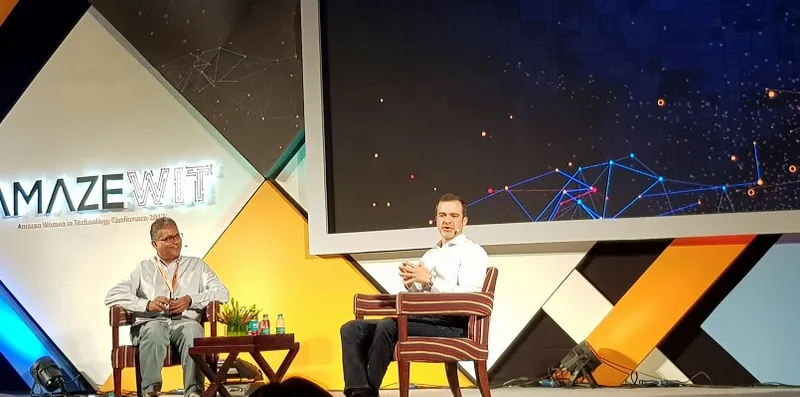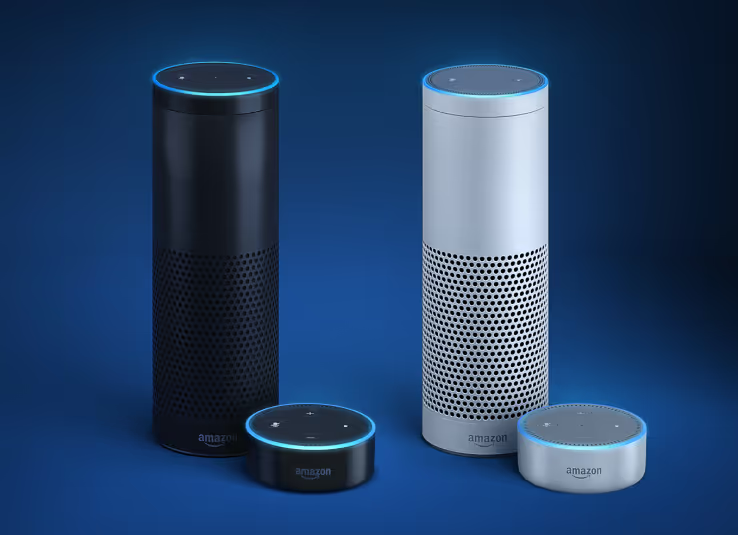We don’t seek to disrupt, we seek to invent, says Amazon’s Jeff A. Wilke
Amazon Worldwide Commerce CEO speaks about Amazon’s customer-obsessed nature, work principles and learning from the past to power the future.

“Good intentions are not good enough, it’s mechanisms that matter.” This is the mantra that Jeff A. Wilke, CEO, Worldwide Commerce, Amazon Inc., swears by. Jeff, second in line at the US-based retail behemoth after founder-CEO Jeff Bezos, handles the retail side, including the marketplace, Prime and Whole Foods.
His statement adheres to what Amazon has been building over the last 23 years since its humble beginning as an online seller of books. Today, having spun its web across continents, Amazon is focusing on India, its fastest growing market.
Jeff has been with Amazon since 1999. An alumnus of MIT and Princeton University, he is in charge of operations at Amazon, and reports directly to Bezos. He flew in to India’s Silicon Valley yesterday, to speak at the Amazon Women in Tech conference at JW Marriott Bengaluru.
To an audience of entrepreneurs, techies, aspiring entrepreneurs and industry experts, Jeff elaborated on Amazon’s principles, learning from mistakes, what Amazon is building now, and what is in store for its future in technology.
Crafting the future with tech
Jeff is an optimist when it comes to technology; he sees it as a way to change lives.
He says, “For the last 100 years, tech has bettered lives, helped people. We apply tech to invent and help coders, sellers, developers, entrepreneurs, creators, merchants, et al to be successful. Our products, including AWS and marketplace business in India, help small businesses use the tools of technology that we have invented.”
Although disruption is the buzz word among startups working with technology, Jeff goes old school.
“We don’t seek to disrupt, we seek to invent. We are excited to invent; sometimes disruptions happen during the process,” he says.
In fact, this thirst for invention is so ingrained in Amazon’s culture that, Jeff says, when they ideate a product, they write the press release to reveal to the world on the day of the launch of that product.
“We keep working on it till we feel proud of it. This process has really helped the entire company organise around customer obsession as opposed to a competitor,” he says.
For a company that calls itself the world’s most customer-obsessed one, operationalising that customer obsession is no easy task.
“We have many organisations around the company for resources working on individual areas – we want them to wake up every day and think about nothing other than their area for invention,” Jeff says.
Tech for the present and the future
Amazon is working on great tech at present, and on greater tech for the future. Starting with the example of Alexa, Jeff says Amazon wants to build technology with which a user can interact the same way s/he would do with other people.

Photo courtesy: Tech Crunch
In India, Alexa launched with 10,000 skills in October. Alexa is currently English based; India is multi-lingual. Jeff says, “Anything we can do with tech now should be possible with Alexa eventually. We want Alexa to understand dialects and languages in India too; we have a huge team working on it.”
Amazon has also filed a patent application for using drones for order delivery in India.
Jeff says scientists and experts in aerodynamics ad aerospace are working on their drone programme. “We are working on computer vision and sensors for safe landing of drones. They have to find their way and see what is around.”
In India, they are focusing on Machine Learning, which enables responses to be automated for customers’ queries in the Q&A page in the natural language.
“Tech powers everything we do. We have robotics in our fulfilment centres in many parts of the world, where we have around 1,00,000 small turtle-like robots which run between shelves and lay out the stack,” he says.
Jeff is quick to assure that such advanced technology is not eliminating opportunities for human work. “Tech enables better, safer and healthier life. We have hired 1,50,000 warehouse workers at fulfilment centres in the last two years alone. They work alongside robots,” he adds.
Learning from failures
Experiments give no guarantee on the outcome. But Jeff says Amazon’s culture embraces the idea of not being afraid to get to the next level. He recollects what he calls the “largest failure”.
“When we began our marketplace business in the US, it started as tech for auctions in 1999 called ‘zShops’. Each seller could set up a store on it, but it did not attract customers. So we listed sellers’ catalogue alongside ours – rather than open their stores – and customers liked it.”
Amazon is clear on its values. They have been working on 14 leadership principles since 2002, including customer obsession, operational excellence, invent and simplify, accept that you will be misunderstood at times, building better tools for processes and inspection to ensure that the tools work, and that people are using them.
Jeff says they are always seeking diverse perspectives.
“So even if we are misunderstood for long periods of time, that’s okay. It is not arrogance, but confidence. Listening carefully is a major principle,” he says.







